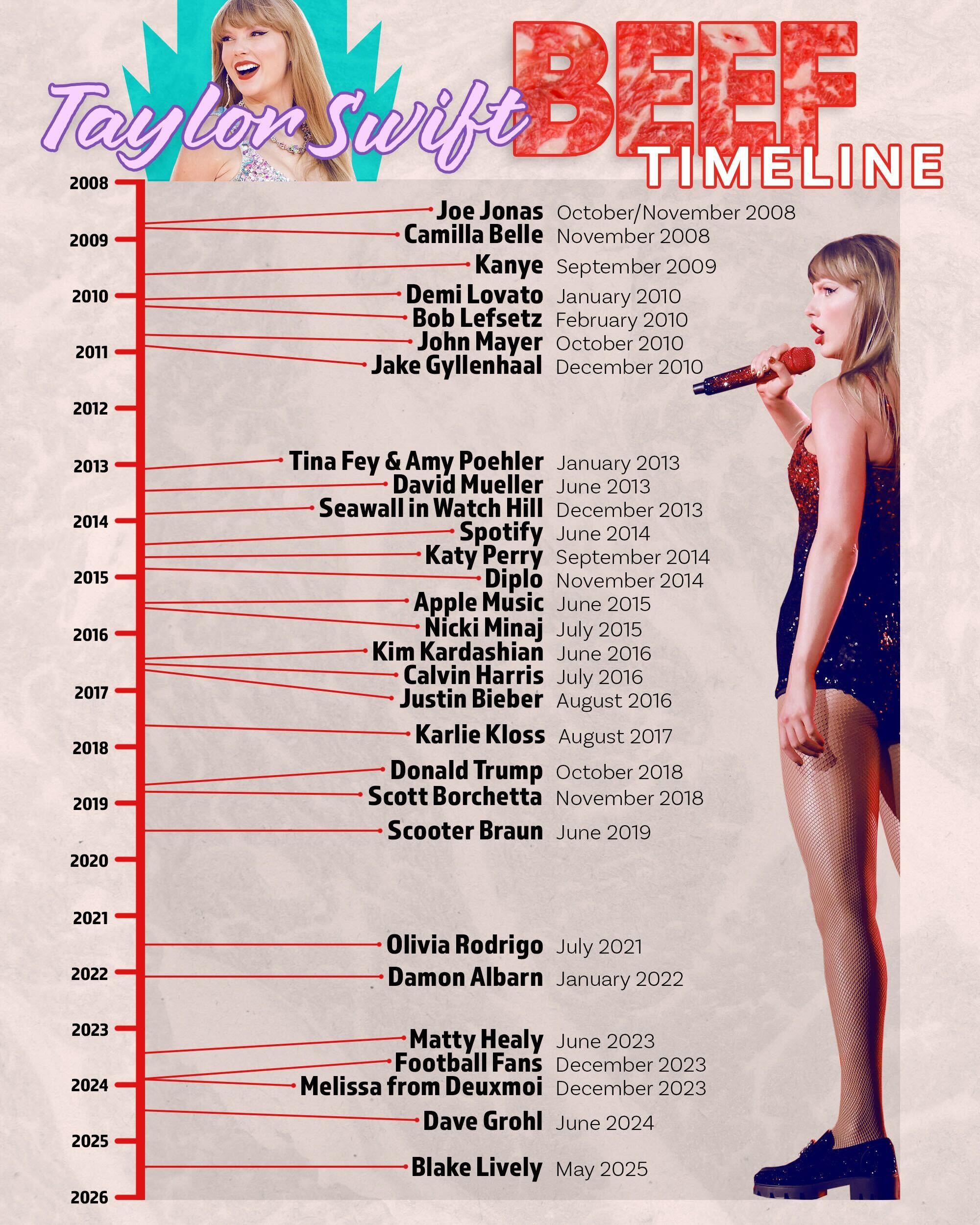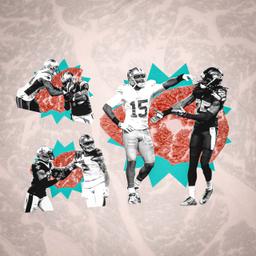Welcome to Beef Week! Over the next four days, The Ringer will continue its retrospective exploration of the past 25 years by delving into one of the quarter century’s defining features: delightfully petty feuds.
Taylor Swift has an album called Lover, but she’s also a fighter. Over the course of her multi-decade career, love stories have animated Swift, certainly, but so has conflict, from petty dramas to epic feuds—some of which have altered the course of music history. She may have a song titled “I Forgot That You Existed,” but Swift is known to stand her ground and hold a grudge—she may forgive, she could forget, but she will never let it go. Our preeminent pop star is also one of the most prolific purveyors of beef of this century.
So what’s the anatomy of a Taylor Swift beef?
It can start big or small. Over the years, Swift has beefed with niche music critics, surfers and Rhode Island homeowners, Kim Kardashian, Kanye West, and some of the biggest tech companies and streaming platforms in the world. By my count, she’s had 29 public beefs, the first being with ex-boyfriend Joe Jonas in 2008, and the most recent being a budding beef with once bestie Blake Lively. There were instances before Jonas in which Swift showed her capacity to clap back, of course, on songs like “Picture to Burn” off her debut album, where her beef at the time was with a guy who wouldn’t let her drive his stupid pickup truck. But after Jonas broke up with Swift via phone call, everyone learned something about her willingness to name names and air dirty laundry in song. The intro to the song “Last Kiss,” off Speak Now, is 27 seconds long—the same exact length as the fateful call.
When Swift beefs, she tends to win. I can count just two times in her career when Swift took a clear and obvious L in a public beef. Both were relatively petty. One was with Tina Fey and Amy Poehler, who told a (pretty harmless) joke at her expense at the 2013 Golden Globes about not going out with Michael J. Fox’s son. After the event, Swift responded in Vanity Fair, vaguely misappropriating a Madeleine Albright quote by saying, “Katie Couric is one of my favorite people, because she said to me she had heard a quote that she loved that said, ‘There’s a special place in hell for women who don’t help other women.’” You have to be a medium-intrepid Swiftie or someone who really cares about the Golden Globes to even remember that this happened, but Swift came off as a poor sport. The other loss was also related to an awards show, the 2015 VMAs, after Nicki Minaj questioned the lack of a nomination for her “Anaconda” video by tweeting that the nominations for the big prize, Video of the Year, celebrated “women with slim bodies.”
Though Minaj’s tweet wasn’t broadly read as being aimed at anyone in particular, Swift interpreted Minaj’s comments as a shot at her. She posted back at Nicki, “I’ve done nothing but love and support you. It’s unlike you to pit women against each other. Maybe one of the men took your slot …” Once again, Swift came off as testy, navel gazing, and a bit of an opportunistic feminist. But after Minaj replied that the tweet wasn’t about her, Swift backed off. This is another beef that won’t make the first 100 pages of her bio.

The big fights she has won, most often by playing the long game. Of course, there was Kanye, who fatefully interrupted Swift on stage at the 2009 VMAs, kicking off a years-long battle of songs, statements, a surreptitiously recorded and selectively edited phone call on one side and the entire Reputation era on the other.
The gavel has largely come down in Swift’s favor in the Kanye beef, in part due to the eventual revelation that Kardashian had edited the tape that she had posted, and in part due to West’s increasingly horrific public behavior. But that doesn’t mean it’s all said and done. On Swift’s most recent album, The Tortured Poets Department, she included a song called “thanK you aIMee.” The lyrics tell the story of a glorious triumph over a bully named “Aimee,” who had caused years of torment and then eventually tried to re-ingratiate herself with her victim. For those not versed in Swiftie Easter egg hunting, the capitalized letters in the song title spell out “KIM.”
Over the years, Swift has picked a number of fights with powers that be in the music industry for the betterment of artists’ rights. In 2015, she wrote an open letter to Apple Music and posted it on her Tumblr page in which she explained that she was keeping her album 1989 off the streaming service because of its plan to not pay artists regular royalties for music streamed during a 30-day free trial period offered to new subscribers. Apple quickly changed the policy. From 2014 to 2017, she withheld her catalog from Spotify (which owns The Ringer) in order to secure better royalties.
As she got further into her career, the idea of owning the rights to her master recordings became deeply important to Swift, a desire that wound up forming the basis of her other totem conflict, with music executive and talent manager Scooter Braun. On some level, this beef and Swift’s history with West are part of one big feud. Her original problem with Braun was that he’d been an adversary as West’s former manager. So when the rights to Swift’s first six albums were sold in 2019 against her desires, to Braun, someone she already couldn’t stand, the beef of her career began.
If it wasn’t already clear how far she’d go to stand on business—to borrow a phrase from another former Braun client—Swift re-recorded and released four of those albums, reanimating her career in the process and gathering the leverage she needed to buy the originals back this past spring.
Braun escaped with a tidy profit, selling off the masters to Shamrock Capital in 2020 once he saw the heat coming. But this was an ultimate triumph for Swift.
“People often greatly underestimate me on how much I’ll inconvenience myself to prove a point,” Swift said in 2022 at the Tribeca Film Festival, where she premiered a short film tied to her re-recording of the extended version of “All Too Well.”
And of course, along the way, Swift’s beefs have led to many, many songs. By my count, Swift has 44 songs directly inspired by conflicts. This count is, of course, subjective—not all songs about breakups count, though some, of course, clearly do.
None of the songs she wrote about Harry Styles are about beef, for instance. But “All Too Well,” the consensus pick for her best song ever, is about pain and memory and healing, but it’s also about beef—the recriminations and airing of petty grievances about cringeworthy Etsy-feminist keychain digs make it so.
“Bejeweled” is a song about beef. Reputation is an album about love disguised as an album about beef; Midnights is an album about beef disguised as an album about love. Her worst song about beef is probably the Kanye-inspired “Innocent,” though I really only care for “Bad Blood” if it is performed live, preferably with pyrotechnics. “It’s Time to Go,” a bonus track off Evermore, almost certainly includes a reference to the end of her friendship with Karlie Kloss. That’s the beef I’d most like insight into if I could give truth serum to everyone involved.
My favorite song by Swift about pure, Angus beef? That’s 2010’s “Mean,” inspired by Nashville insider and music newsletter writer Bob Lefsetz’s column, which followed a pitchy performance by Swift at the 2010 Grammys. Lefsetz wrote that she’d tanked her career in one night. (There is something about awards shows, Swift, and conflict.) If you’re ever feeling attacked, I can’t recommend enough a shout-sing of the outro, specifically the part where Swift sings, “All you are is mean! And a liar! And pathetic! And alone in life and MEAN!” That is some good beef.
Even outside of her music, Swift’s pen is mighty when it becomes a sword:
- On Kanye and Kardashian releasing that edited video: “I would very much like to be excluded from this narrative, one that I have never asked to be a part of, since 2009.”
- Testifying against David Mueller, a Colorado-based radio DJ who groped Swift at a meet-and-greet event, when asked why there wasn’t photo evidence that showed Mueller’s exact hand placement: “Because my ass is in the back of my body.”
- On the grumbling around Westerly, Rhode Island, over her decision to build a new sea wall in front of her oceanfront mansion: “Nothing has changed about anyone’s beach experience, except that now my house won’t fall on them. So, you know. Sorry not sorry.”
So haters are gonna hate, hate, hate, hate, hate. By now we should all know that if you come for Swift, you do so at your own peril, and potentially for Swift’s ultimate benefit. There’s a type of question she’s been asked more than a few times over the years, which essentially boils down to what she’ll write about if she’s ever in a stable, long-term, loving relationship. It’s more than a little sexist, but it also reveals a lack of close attention—Swift can beef about almost anything!
There have been moments when that has come off poorly, as petty or as punching down. The low point in Swift’s back-and-forth with West was when she performed “Innocent” at the 2011 VMAs. It was forgiving to the point of condescension but, worse, she failed to recognize her own power at the time. On the flip side, Swift’s best moments have tended to come when she’s picked battles worthy of her power, by going after politicians or longstanding music business practices or stubborn attitudes in country music circles. These fights have invigorated her work. It’s not an accident that when I mention songs like “Mean” or “All Too Well” as some of the best Swiftian beef tunes ever, they’re also songs that belong in any Swift pantheon.
She is Taylor Swift, purveyor of bangers and beef—proceed with open ears but an abundance of caution.











